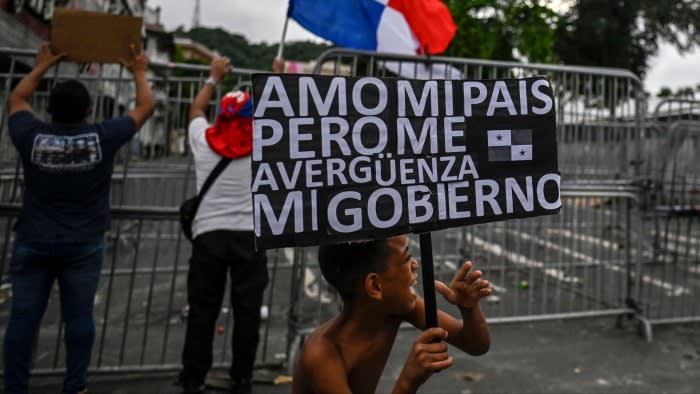
Unlock the Editor’s Digest for free
Roula Khalaf, Editor of the FT, selects her favourite stories in this weekly newsletter.
Panama, once Latin America’s star economy, is close to losing its investment-grade status as another ratings demotion looms, with the next president set to inherit its biggest economic challenge in decades.
A post-dictatorship boom in the Central American country famous for its canal, an important global trade artery, is fading, with the IMF forecasting a dramatic slowdown in gross domestic product growth to 2.5 per cent this year, from 7.5 per cent in 2023.
A big factor is the abrupt shutdown of a huge copper mine after widespread protests last year, as anger against political corruption fused with growing environmental concerns.
The closure will complicate the dollarised country’s battle to reverse a sharp rise in debt levels since the pandemic. Last month, Fitch relegated Panama’s sovereign bonds to junk territory, with the markets pricing in further downgrades from the rating agencies. S&P already holds a negative outlook on the country.
In early May, voters are set to choose a new president from a slate of mostly economically liberal candidates who have largely avoided committing to detailed policies to address the country’s problems.
“We’re at an important inflection point for Panama,” said Nicolas Jaquier, emerging markets fixed-income analyst at investment manager Ninety One. “There needs to be some realisation of that among the politicians — to try to steer the growth model towards something more sustainable.”

It usually takes a little over three months for a second downgrade to junk, which would force some funds to sell Panama’s bonds, according to Goldman Sachs analysts. They noted it might take longer in this case as Moody’s has a stable outlook and S&P rates it two notches above junk. Junk ratings from two of the three leading credit agencies would end Panama’s investment-grade status.
With investors then demanding higher interest payments to buy its bonds, Panama’s election winner would have to navigate significant fiscal challenges and a populace fed up with an out-of-touch political class.
The economic problems are considerable. The operator of the closed copper mine, First Quantum, is seeking a minimum $20bn in arbitration.
Economists say the country’s generous pension scheme needs reform to be fiscally sustainable. A new reservoir for the country’s canal — to help boost shipping revenues as incidences of severe drought increase — is still awaiting approval.
“The structural problems we have are very difficult to discuss in a political campaign,” said Domingo Latorraca, a consultant and former vice-minister of the economy. “[But the candidates] are conscious that they can’t keep delaying addressing some of these problems.”

Panama’s progress after a US invasion in 1989 to overthrow General Manuel Noriega’s junta was remarkable. Growth and development far outstripped regional averages, with poverty slashed to about 13 per cent in 2023 from almost 50 per cent in 1991.
The success was driven by a boom in construction investment, according to economists who caution that underlying issues such as public education were not addressed sufficiently.
But Panamanians are acutely feeling the slowdown. Almost three-quarters of respondents surveyed in January said they felt economically worse off than the prior year, one of the highest proportions in the region.
Panama’s President Laurentino Cortizo, a social democrat and former cattle rancher, holds approval ratings of just 19 per cent, according to pollster CID Gallup.
After the Fitch downgrade, Panama’s government said the economic fundamentals were solid, with growth still robust. The IMF recently praised significant fiscal consolidation since the pandemic.
For many Panamanians, the face of the boom years was former president Ricardo Martinelli, a supermarket magnate now living in the Nicaraguan embassy to avoid arrest.
A recent conviction for money laundering bars his candidacy from May’s election despite leading polls by a wide margin. Analysts said his persistent popularity undermined Panama’s attempt to shake off its reputation as a haven for shady money with high levels of corruption.
José Raúl Mulino, his chosen replacement, has assumed his double-digit lead, though the constitutional court is still considering whether he can be on the ballot. Investors, meanwhile, are looking at how much power the eventual winner will be able to wield in congress.
“If [the winner] gets a good, strong mandate, then that could put him in a more favourable position to try to address these issues,” Jaquier said.
Edwin Cabrera, vice-president of the Panamanian Institute of Civic Studies, is less optimistic. He said the campaigns had been very critical of traditional politics, but offered few recipes for the country’s problems.
“I’ve been watching elections since 1980, in dictatorship and now in democracy. This is the most unusual campaign,” said Cabrera, who is also a prominent radio host. “The challenges the country faces are enormous, and that’s what worries me a lot.”
